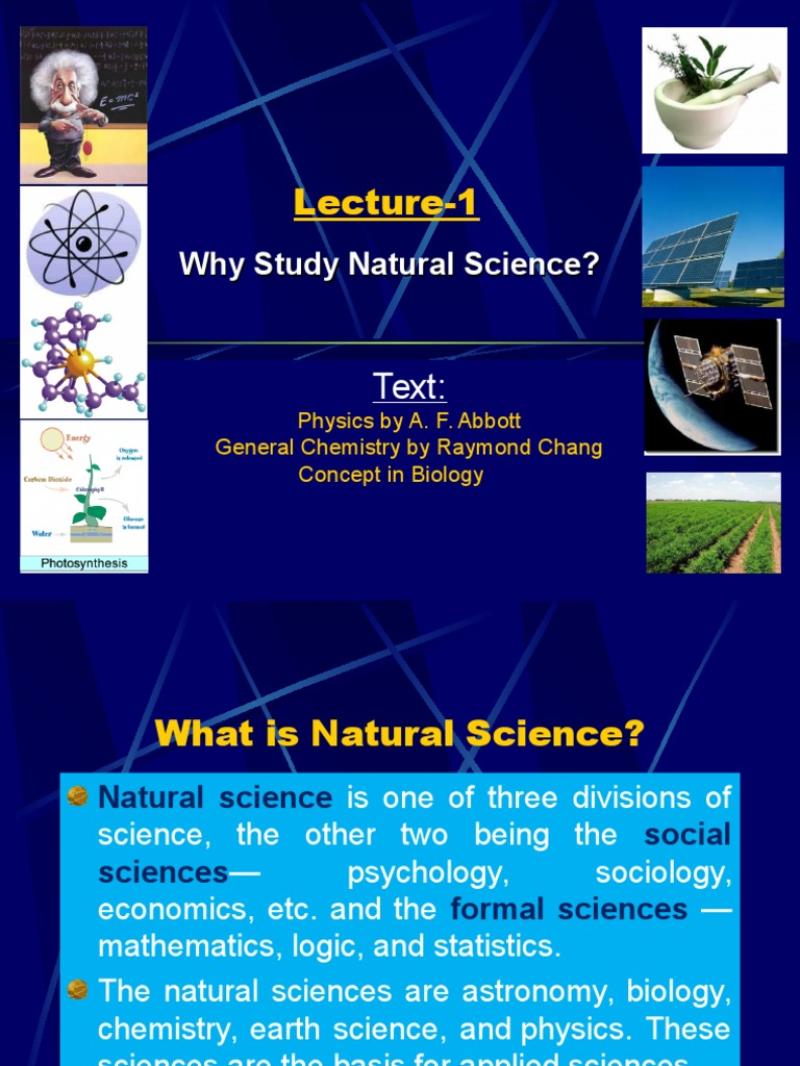Why studying natural science is important?
Studying natural science, which includes disciplines like biology, chemistry, physics, astronomy, and earth sciences, is crucial for several reasons:
Understanding the Natural World: Natural science helps us comprehend the natural phenomena and processes that govern the world around us, including how living organisms function, the behavior of matter and energy, the structure of the universe, and the dynamics of Earth's systems.
Problem Solving and Critical Thinking: It fosters critical thinking skills by teaching how to observe, analyze data, form hypotheses, conduct experiments, and draw conclusions. These skills are applicable not only in scientific research but also in various aspects of everyday life and decision-making.
Innovation and Technological Advancement: Natural science forms the foundation for technological advancements and innovations. Scientific discoveries in fields like physics and chemistry have led to developments in medicine, technology, engineering, and countless other areas that improve our lives.
Environmental Awareness: Understanding natural sciences is crucial for recognizing environmental issues, such as climate change, pollution, and biodiversity loss. It equips individuals with the knowledge needed to address these challenges and promote sustainable practices.
Health and Medicine: In fields like biology and medicine, natural science is vital for understanding human anatomy, diseases, and potential treatments. It contributes to advancements in healthcare, leading to better diagnoses, treatments, and overall health outcomes.
Education and Career Opportunities: Studying natural sciences opens up a wide range of career opportunities in fields such as research, healthcare, environmental conservation, education, technology, and more. It provides a strong foundation for various professions.
Cultivating Curiosity and Wonder: Natural science encourages curiosity and a sense of wonder about the world. It sparks interest in exploring the unknown, fostering a deeper appreciation for the complexities and beauty of nature.
Global Understanding: Natural sciences provide a common language and framework for understanding global issues. They facilitate international collaboration in addressing challenges that affect humanity on a global scale.
In summary, studying natural science is essential for understanding the world we live in, fostering critical thinking, driving innovation and technological progress, addressing environmental and health challenges, and preparing individuals for diverse career opportunities. It plays a fundamental role in shaping our understanding of the universe and empowers us to make informed decisions that impact our lives and the world around us.
Scientific education plays a pivotal role in shaping individuals' understanding of the natural world, fostering critical thinking and problem-solving abilities, nurturing a sense of appreciation for the interconnectedness of ecosystems, and preparing individuals for careers in STEM fields. Moreover, scientific literacy empowers individuals to make informed decisions about environmental and sustainability issues.
Firstly, scientific education provides a framework for understanding the fundamental principles and laws that govern the natural world. Through inquiry-based learning, students engage in hands-on experiments, observations, and data analysis to uncover the patterns and processes that shape our planet. This exploration fosters curiosity, intellectual growth, and a deeper appreciation for the scientific method.
Secondly, scientific education cultivates critical thinking skills and problem-solving abilities, essential tools for navigating complex issues and making informed decisions. Students learn to evaluate evidence critically, identify patterns, formulate hypotheses, and design experiments to test their ideas. These skills are transferable and applicable to various aspects of life, beyond the realm of science.
Thirdly, scientific education highlights the interconnectedness of the natural world. Students gain an understanding of how organisms interact with their environments, how ecosystems function, and how human activities can impact the delicate balance of nature. This awareness fosters a sense of environmental stewardship and a commitment to sustainable practices.
Fourthly, scientific education provides a strong foundation for pursuing careers in STEM fields, which are crucial for driving innovation, solving global challenges, and shaping the future. Students develop the knowledge, skills, and problem-solving abilities required for success in fields such as biology, chemistry, physics, engineering, and computer science.
Finally, scientific education empowers individuals to make informed decisions about environmental and sustainability issues. By understanding the scientific principles underlying climate change, pollution, resource management, and other environmental concerns, individuals can engage in informed discussions, advocate for sustainable practices, and contribute to positive environmental change.
In conclusion, scientific education plays a multifaceted role in preparing individuals for the 21st century. It cultivates critical thinking, problem-solving, and communication skills; fosters appreciation for the natural world; and empowers individuals to make informed decisions about environmental and sustainability issues. Scientific literacy is essential for navigating the complexities of our world and shaping a sustainable future for all.












